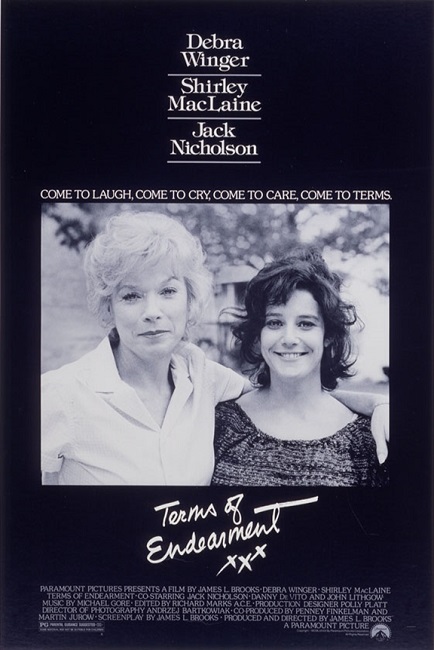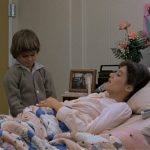
Terms of Endearment – 1983
I went into this Best Picture winner knowing only what I had been told. This is a chick-flick. A tear-jerker. Not really my kind of movie. But I have to admit. It did its job. I shed a tear or two for the characters on the screen. How could I not? Cancer is never a pleasant subject.
Shirley McLaine, Jack Nicholson and Debra Winger star in this film that I’m not sure if I liked or not. The acting was fine, the casting was fine, the filming locations and production values were good. Even the basic plot was acceptable. But it was the characters that I just didn’t like. Thus, I had a hard time liking the movie, in general.
McLaine plays the part of Aurora Greenway. She is a mother who is so overbearing, over-protective, and over the top that her only daughter is embarrassed of her and can’t wait to get away from her. Winger plays Emma, the daughter that is socially and emotionally damaged by her clingy and invasive mother.
Not one minute into the movie and I already didn’t like Aurora and here’s why. The opening scene is one in which she is a new mother. Her infant child is sleeping in her crib. She can’t hear the baby crying, so she assumes something is wrong. Within seconds, her paranoia escalates into thinking the baby has suffered a crib death. Her husband can be heard from the other room, exasperated and annoyed at his wife’s outlandish assumptions. She goes in and wakes the baby, then actually attempts to climb into the crib with her. When the infant starts to cry she is satisfied. “Good,” she says as she leaves the crying baby in the dark.
I think that little scene was supposed to be humorous, but I instantly saw her neurotic behavior for what it was: unreasonable and paranoid. I was not amused. I was disturbed. When the little girl is around 6 or 7 years old, her father dies. The mother continues her neurotic behavior by waking her daughter and sleeping with her in her bed. That kind of mother would drive anyone crazy.
Eventually Emma is ready to get married. The movie never discloses where she met Flap Horton, played by Jeff Daniels. But Aurora is so narcissistic that the night before the wedding, she begs her daughter not to go through with the marriage, calling it the biggest mistake Emma would ever make. To me, it was a transparent attempt to keep her daughter at home with her. At this point I still liked Emma and I applauded her response. If you disapprove of the man that much, then don’t come to the wedding. Aurora was such a mean mother that she boycotted the wedding.
You get the picture, don’t you? Aurora was not a nice person and I, as a viewer, had very little sympathy for her. But then the daughter starts some bad behavior of her own. She starts cheating on her husband and showing signs of mental instability. But the strange thing about that is the fact that she takes the affair so casually. It is as if adultery is acceptable behavior. She talks to her mother on the phone about it. She even goes so far as to talk on the phone to her lover, Sam Burns, played by Jonathan Lithgow, in front of her children.
But then her behavior sinks even lower! She catches her husband, Flap, having an affair of his own. Not only does she not tell him about her own cheating, but she blows up and comes down on him for his infidelity! Apparently what is good for the goose is not good for the gander!
In the meantime, Aurora begins having an affair with her neighbor Garrett Breedlove, played by Jack Nicholson. This one was alright with me because neither of them were attached to anyone else. At that point, I said “Good for them!” Garrett’s big problem, however, is a fear of commitment which becomes evident when Emma arrives with the kids in tow and Aurora tries to introduce them to him. He literally runs for cover.
But then everything changes when Emma is diagnosed with terminal cancer. This whole part of the plot took place so quickly that it seemed like minutes after the tumors are found, she is on her death bed. Then everybody in the family comes together to see her off. Even Aurora and Flap, who have never liked each other, share a moment of tears and sorrow when Emma dies.
Sure, I shed a few tears of my own at that, but honestly, not that many. I saw it coming. Winger was nominated for Best Actress, but lost to McLaine. I think they both did a fine job in their respective roles, but I’m just not sure the roles themselves were worth Academy Awards. In addition, Lithgow was nominated for Best Supporting Actor, though Nicholson took home the Oscar in that category. As I have said before, I did not see what they were up against at the Awards, so I cannot make an informed opinion as to whether or not they deserved their Oscars.
Interesting note: In an interview with Barbara Walters, Bette Davis said “At least Terms of Endearment was an authentic film about relationships, and I must say that Miss Shirley McLaine gave an outstanding performance, but then she’s always good.”
For me, the film was pretty average with characters that I didn’t like very much, that is, until Emma’s cancer was diagnosed. Then the best qualities of the characters started to emerge. This is where the abilities of the talented cast of actors really started to shine. Emma changed from a simplistic character I didn’t like to a human being dealing with a terminal illness. Aurora changed from a mean and self-centered mother to a woman who is terrified as she watches her only child suffer and die.
I think that I saw it in this way. The majority of the film was supposed to be a romantic comedy. Aurora’s overbearing and stern attitude was supposed to be funny. Emma’s quirky mental issues were supposed to be humorous. Garrett’s lecherous antics were supposed to be laughable. And there were brief moments when they were. But once Emma got sick, the little humor that was there vanished.
I know I am over-simplifying the movie. There were, of course, more subtleties than I am giving the movie credit for. I just find it hard to like a movie in which I did not like any of the main characters. That being said, there were things about the movie that I liked very much. I liked how the script treated the characters after the cancer was diagnosed. The film became a drama that was able to move me emotionally.
I also have to give a special thumbs-up to Troy Bishop who played Tommy, Emma’s eldest son. For a child actor, he really did a fantastic job. Of course it was a smaller part, but he played it well. Tommy was a troubled young man who had anger issues because he felt unloved by his parents. On top of that, he had to listen to his parents fight all the time. I’m sure that many people have had similar experiences growing up. When he visited his mother for the last time in the hospital, he really stood out to me as a very believable character.
Interesting note: Apparently, there was a sequel to Terms of Endearment called The Evening Star which came out in 1996. McLaine and Nicholson both came back to reprise their roles. The story takes place 15 years after Emma’s death. The character of Tommy, it is revealed, is in jail on drug charges.
Now, I have to mention something that is a bit of a personal contradiction for me. I happen to like Jack Nicholson as an actor. He has a natural presence on the screen that is fascinating to watch. But I have to say that he is something of a one-trick-pony. He is basically the same character in every movie I have ever seen him in. Only the name and situation changes. I watched him in Terms of Endearment and I clearly saw him in 1975’s One Flew Over the Cuckoo’s Nest, 1987’s The Witches of Eastwick, 1980’s The Shining, and even 1997’s As Good as it Gets. And those are just the movies I know him best from. That being said, he is always interesting to watch.
When it comes down to it, I have to leave it at this: I am pretty ambiguous about this movie. I’ve never been a huge fan of romantic-comedies. But I liked McLaine and Nicholson. I didn’t particularly like any of the characters, but I liked some of the acting. The soundtrack was pretty unmemorable, but I liked the production standards. I wasn’t impressed with the comedy, but I liked the drama. There was very little romance to be moved by, but it had a reassuring ending.
Oh, about the ending… reassuring is an apt word. There was a great deal of sadness and loss caused by Emma’s death. But the family seemed to be doing alright, implying that bad things happen, and unfortunately, it is a part of life. But once we get past the initial grief, life goes on and it is possible to be happy again. That, at least, is a positive thought and one that is worth remembering.








